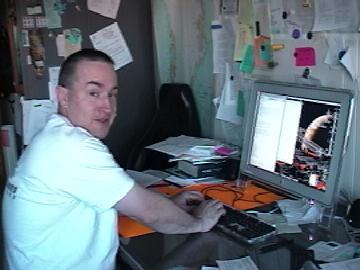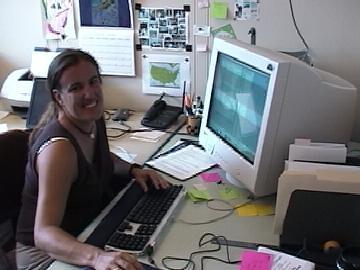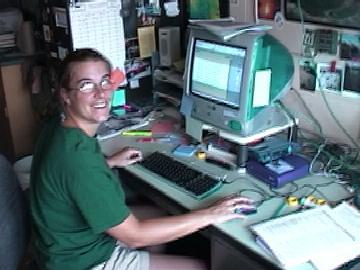9 July, 2002
Writing
Writing is an integral part of research. In fact, the main activity I've observed among the researchers that are part of the ANSMET team is writing. Dr. Ralph Harvey sets aside an
hour or two every morning dedicated strictly to writing. Sometimes he's writing an important paper. Other times, he's updating the ANSMET website and answering e-mail. No matter the importance of the document, he feels it's important to get some writing done every day.
One measure of success as a professional scientist is how frequently one is published. Often careers are entirely dependent on whether one's research is published in a
respected journal. Much like high school students, many researchers put off their writing to the last minute and are overwhelmed at the task ahead. Ralph believes that if one
writes a little every day, the burden of publishing is much less. With so many responsibilities, it's necessary for him to block out some time every day and do some writing.
Dr. Nancy Chabot and Cari Corrigan are writing for very different purposes. Nancy is presenting in a couple of weeks at the Meteoritics conference in Pasadena. She has two
computers going at once with one dedicated to data and the other her speech. Cari is working on her dissertation. She is about a year away from graduation, but understands that her dissertation must be written and rewritten several times before it's finished. She will be leaving soon to do some work in Tucson, so it is important that she gets as much
writing done now as possible.
I try to stress to my students the importance of writing and presenting one's ideas in science. Some students come into science thinking that science is all about doing experiments and watching demonstrations. But, the real power of science comes from interpretation and presentation of the data. If one's data is presented in a logical, professional manner, chances are likely that those reading it will be inclined to support it. My former boss, Dave Burchett used to tell me that one is judged by the way they write, because usually the first contact you have with someone is through written
communication. Writing is like anything else; it takes practice and dedication. After reading this, I hope you're inspired to write.

Dr. Ralph Harvey working on a project.

Dr. Nancy Chabot working on two computers at once.

Cari Corrigan working on her dissertation.
Contact the TEA in the field at
.
If you cannot connect through your browser, copy the
TEA's e-mail address in the "To:" line of
your favorite e-mail package.
|
